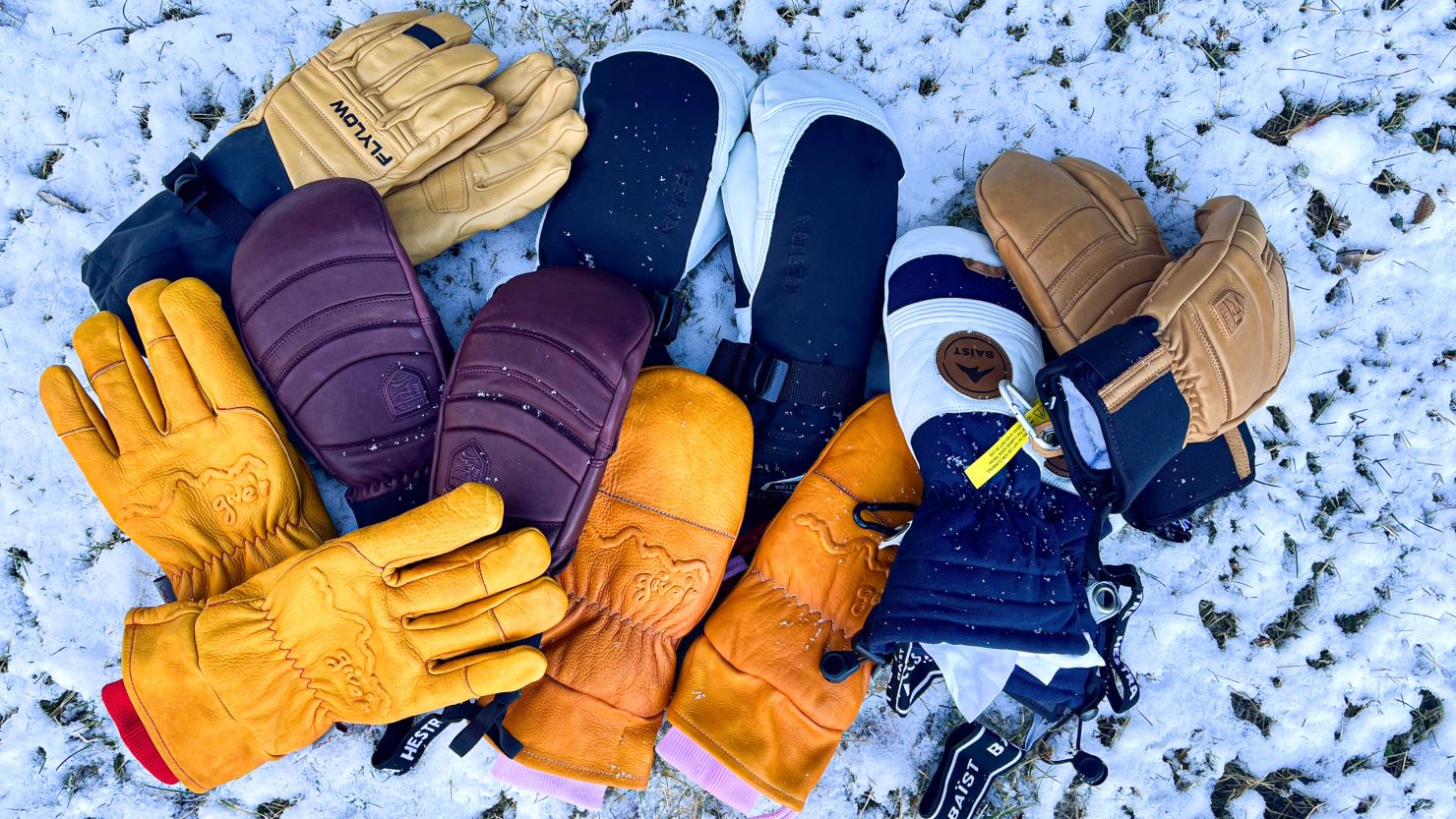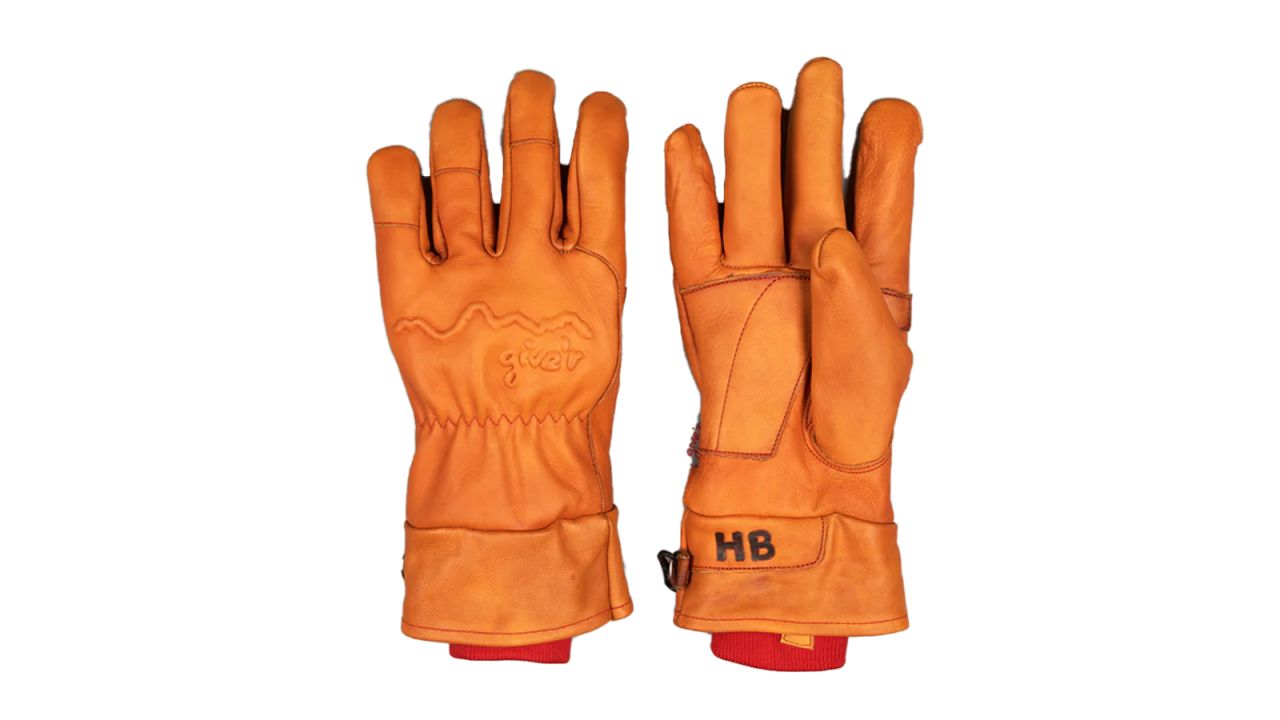The best ski gloves and mittens we tested:
Best ski gloves overall: Give’r 4-Season Gloves
Best short-cuff ski mittens: Hestra Fall Line Mitt
Best gauntlet mittens: Ba?st Mitt
Best budget ski gloves: Outdoor Research Revolution II Gore-Tex Gloves
There’s nothing quite like cold hands to ruin an otherwise perfect ski day. And really, I speak from experience. As a lifelong skier with Raynaud’s Phenomenon, I’m constantly on the hunt for ski gloves that allow me to go bell to bell without needing to duck inside the lodge to thaw my white fingers.
But, I’m not alone — everyone on the ski hill deals with cold fingers, so we set out to find the best pairs of ski gloves and ski mittens available this season. To do that, we stashed mittens in our freezer and dunked gloves in a sink full of water. We even timed ourselves while changing goggle lenses and buckling ski boots to test out the dexterity. In the end, we found four pairs of gloves and mittens that topped the rest. Here are the results.
It’s tough to claim versatility in this category, but the 4-Season gloves pull it off with a shocking amount of warmth, bomber durability and incomparable weather resistance. The best part: When you’re done skiing, you can use them for anything — even as work gloves.
Hestra is known for high-quality mittens, and the Fall Line proved it. These mittens crushed our testing, thanks to their relative dexterity (for mittens), incredible warmth and sleek profile that easily tucks beneath a jacket cuff.
The Ba?st Mitt is the real deal. Not only did these mittens have one of the highest warmth-to-dexterity ratios in our testing, but they come in a gauntlet style of cuff that keeps snow out of your jacket sleeve during those deep-powder crashes.
If you want to spend less than $100, you’ll do no better than the Revolution II gloves. Not only do these have amazing dexterity and a surprising amount of features for this price point, but they were near the top of our testing for water resistance.
Best ski gloves overall: Give’r 4-Season Gloves
$119 at Give’r; From $89 at Huckberry
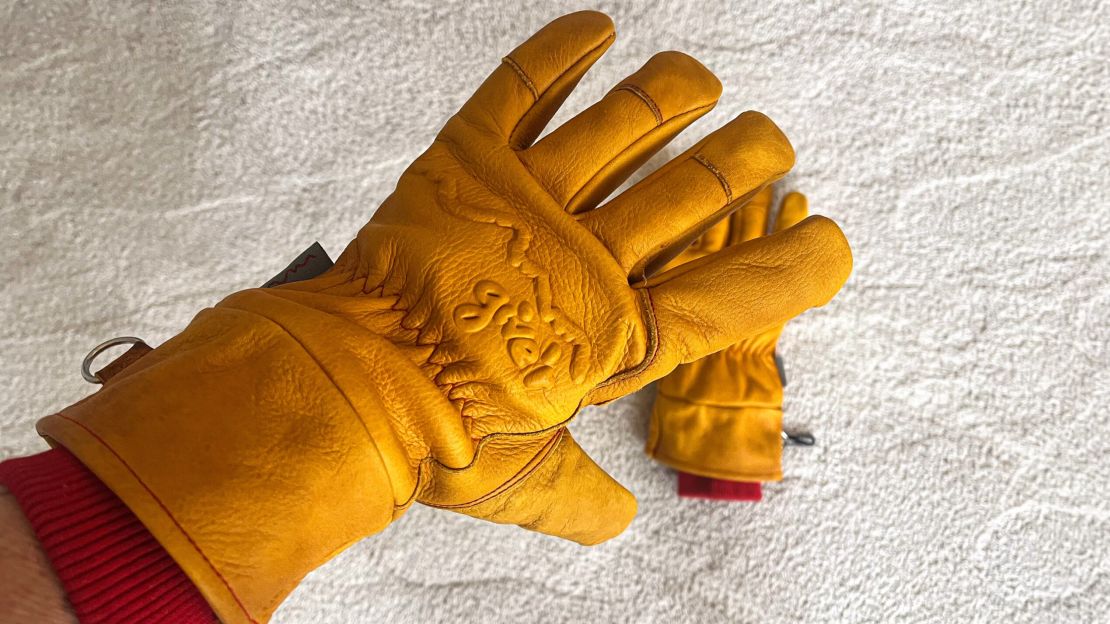
Calling all winter enthusiasts: If skiing is merely one of the many winter activities you enjoy, we promise you’ll love the Give’r 4-Season gloves, our winner for best overall gloves. Designed and touted as “insulated leather work gloves,” the Give’r gloves are supremely comfortable and disturbingly waterproof (more on that below), not to mention plenty warm. While they do lack breathability, that’s a trade-off we’re willing to make for gloves as protective as these.
Give’r doesn’t cater to skiers; instead, these gloves are designed for anyone to use during the winter, regardless of whether they ski, snowboard, walk the dog, ice climb or build snowpeople in their front yard. Their versatility stems from an airtight combination: an all-leather cowhide exterior and a 100% waterproof Hipora membrane (a waterproof-breathable fabric similar to Gore-Tex). This duo makes the Give’r gloves absolutely impermeable. Seriously, nothing is getting through these gloves. We capped most tests at three minutes under the faucet, but we lost track of time with these. After five minutes, they still hadn’t soaked through, and the leather didn’t appear saturated, easily taking the top waterproof spot in our test.
With synthetic Thinsulate insulation, they’re warm too. In our freezer test, they took second for gloves behind the Hestra Fall Line 3-Finger and the Ba?st Classic Glove (mittens will always be warmer). Thanks to the leather-Hipora combination, they felt much warmer during our Peloton testing due to a lack of breathability; our body heat literally couldn’t escape, so sweat built up inside the glove. For folks with really cold fingers, this could be a good thing since it kept our digits even warmer. But, if you run hot, you may find yourself with sweaty hands. Pro tip: We learned the best way to dry these is to pop them on a boot dryer like the DryGuy.
Due to the leather outer, the Give’r gloves feel a bit stiff at first. That’s why Give’r recommends the oven method to help break them in. Once we did that, the gloves felt noticeably more dexterous and we could easily manage boot buckles and ski goggles. But our favorite part may be the possible customization. For just $8 more, you can ask Give’r to burn up to three initials on your gloves. This wasn’t done on the 4-Season gloves, but I do have it on my Classic Give’r Gloves, and it’s a nice touch.
It’s only been a decade since Give’r popped onto the scene via a Kickstarter, but the glove’s top-shelf warmth, incredible waterproofness and inherent durability make these customizable gems our top pick for ski gloves.
Best short-cuff ski mittens: Hestra Fall Line Mitt
$165 at Hestra; $155 From $81 at Evo

If you have chronically cold hands, you won’t regret the Fall Line mittens. They check all the boxes, thanks to a universally pleasing cuff that fits beneath a jacket sleeve, an incredible amount of warmth and ample dexterity for a day on the slopes. While they are on the pricey side of the budget and lack total waterproofness, they more than make up for it with their all-around superior performance.
Most of us reach for mittens because gloves don’t keep us warm. To that end, the Fall Lines were one of the warmest in this test, coming in second only to the Hestra Army Leather Extreme Mitt during our freezer test, where we tucked small thermometers inside the gloves, closed the wrists with binder clips and stashed them inside a freezer for 20 minutes. But the warmth doesn’t come with a loss in dexterity. To be clear, mittens will never give you the same manual proficiency that gloves do, so the Fall Lines were far clunkier than all of the gloves when we tried buckling our ski boots.
In comparison to the other mittens we tested, however, they tied with the Ba?st Mitt for the top spot. They aren’t as puffy as the Army Leather Extreme mittens; we didn’t feel like we had marshmallow hands and could still buckle our ski boots while wearing them. The Fall Lines have a removable five-finger liner inside, which boosts the dexterity further, especially when gripping ski poles.
The Fall Line mittens are not completely waterproof; in our tests, they eventually wetted out, while the Ba?st Mitt, Gordini Cache Gauntlet Mitt, Outdoor Research Revolution II Gore-Tex Gloves, Give’r 4-Season Gloves, Outdoor Research Carbide Sensor Gloves and Give’r Frontier Mittens never did. But that doesn’t mean you’ll leave each ski day with wet hands since most of us aren’t skiing in the swimming pool. The impregnated leather shell is highly water resistant, and each pair of mittens comes with a small tube of leather balm designed to prevent the leather from drying out and to prolong the weather resistance. When applied at least once one to two times per season, the mittens should keep most skiers dry and warm for years. Caveat: If you’re a skier who routinely shreds in the rain, take a look at the Ba?st Mitt (and, ooph — we appreciate your dedication to the sport).
Bottom line: The Hestra Fall Line mittens were at or near the top of almost every test we ran. The mittens excelled in warmth and dexterity, which is a tough combination to beat. Because of this, we awarded them our top spot for short-cuff mittens.
Best gauntlet mittens: Ba?st Mitt
$180 at Ba?st
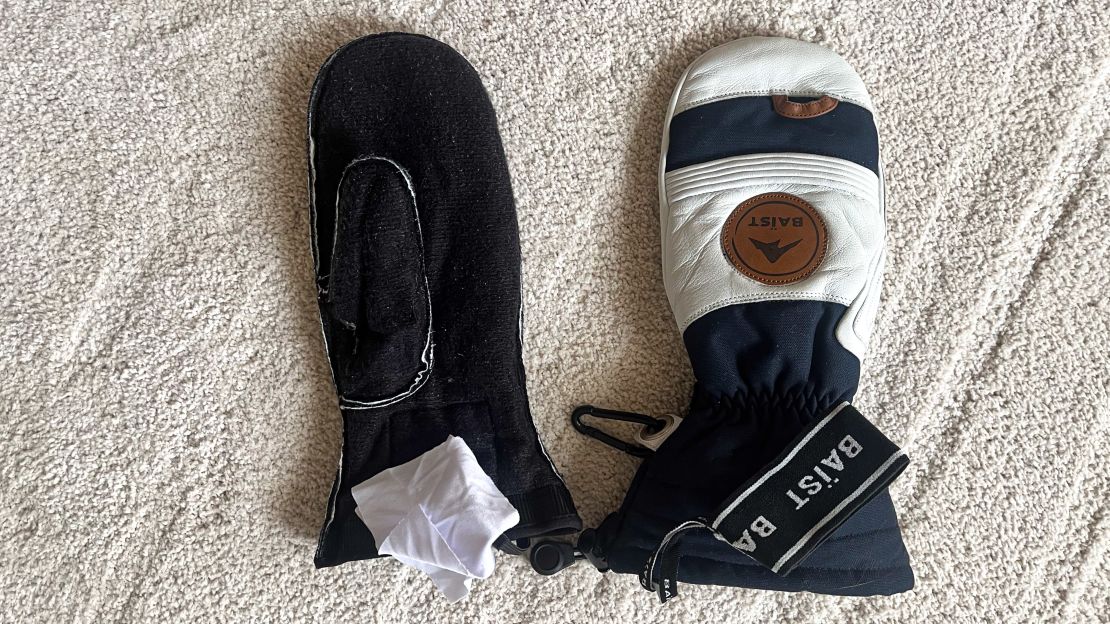
It’s the age-old skier’s debate: Do you prefer your glove to go over the sleeve or under? If you find yourself in the former category and want bombproof weather deflection, snag yourself the Ba?st Mitts. Not only are these workhorses one of the warmest mittens we tested, but they also ranked near the top of the pack for weather resistance. Like the Hestra Fall Line mittens, they aren’t cheap, but we think you get what you pay for in this case.
Gauntlet-style mittens have sleeves that reach over the top of your jacket sleeve and cinch around your lower forearm. Skiers who prefer this style of mitten typically do it for weather resistance; snow is less likely to penetrate your outer layers, especially when shredding powder (or wallowing in powder, depending on your abilities). That’s one of the reasons we love the Ba?st; it’s burly. The goatskin leather and Cordura outer shell reach about 3 inches up your forearm and are tougher than a fortress. In our waterproofing tests, the Ba?st Mitts ranked at the top of the pack. After three minutes of running the faucet on these mittens, they still hadn’t soaked through, and we could still see the water beading down the outer shell.
They didn’t take the top spot in our freezer test — that still went to the Hestra Army Leather Extreme Mittens — but they did come in a close third, just 0.2 degrees behind the Hestra Fall Line Mittens. With numbers so close, we think it’s fair to say that they are equally as warm. Plus, they still offer plenty of dexterity. The Ba?st Mitts have a removable liner constructed with Thinsulate and ThermoLite, two synthetic insulation fabrics. Like the Hestra Fall Line Mittens, the liner Velcros to the wrist of the shell. But unlike the Fall Lines, these liners are regular mittens with no individual finger pockets. As a result, we fumbled a little more while buckling our ski boots, but it was still manageable.
Features are aplenty, which helps offset the higher price tag. In addition to the pull cord at the bottom of the mittens, a Velcro pull strap wraps around your true wrist. This acts as a double wall against snow; nothing will sneak into your mittens. There is also a small microfiber cloth attached to the liner of the left mitten, used to wipe your nose or even your goggle lenses.
Gauntlet gloves are a polarizing style choice: You either love ‘em or you hate ‘em. If you’re committed to the over-the-cuff style, you’ll do no better than the Ba?st Mitts with their supreme weather resistance, bomber warmth and above-average dexterity.
Best budget ski gloves: Outdoor Research Revolution II Gore-Tex Gloves
$89 at Outdoor Research; $89 at REI; From $89 at Amazon
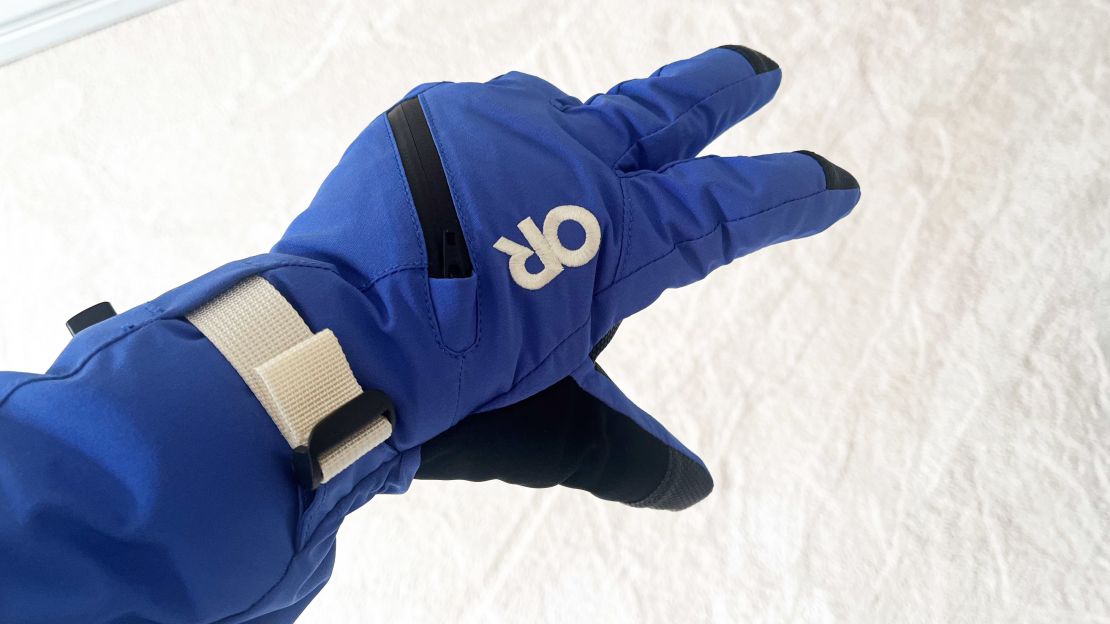
There is a ton of competition for ski gloves that cost less than $100, so it’s tough to stand out. But the Outdoor Research Revolution II gloves surprised us with all-around weather resistance, impressive dexterity and a decent number of features. While they lack the warmth of our other winners, we still feel like they deliver enough value for most skiers to warrant inclusion in our top spots.
For starters, these gauntlet-style gloves were part of the select group at the top of our waterproof tests that remained completely dry after three straight minutes under the tap. In fact, we barely even saw water beading from the surface, so it’s safe to say that skiers in the Pacific Northwest wouldn’t have any issues with these on a moisture-laden powder day. This is largely thanks to the Gore-Tex insert — another nice touch. It’s a rarity to see Gore-Tex used in value-driven products, but that’s definitely the case with the Revolution II gloves.
Dexterity is also very impressive, trumping the Give’r 4-Season gloves and coming in at the top of the test for all of the gloves we tested. We were able to fully articulate all of our fingers with each knuckle as well as manipulate all ski boot buckles and goggles. In fact, we had zero issues grabbing onto small jacket zippers and pull straps too. There isn’t much you won’t be able to handle while wearing these ski gloves.
Features are heavier than you’d expect at this price point. Not only is there a cinch at the end of the gauntlet wrist, but there is also a pull strap around the true wrist to act as a double wall against snow. A small zipped pocket on the back of the hand fits a car key or a tube of lip balm, and the fingertips are touchscreen compatible.
Of course, ski gloves are all about giving and taking. With the weather resistance and relatively affordable price comes a trade-off: They aren’t the warmest. The Revolution II gloves came in the middle of the pack during our freezer test, but they felt noticeably warmer during our Peloton rides. For someone like me with terrible circulation, they may not be the best bet, but if you run warm and/or want a supremely dexterous and waterproof glove for spring skiing, these are tough to beat.
Everything you need to know about ski gloves and mittens
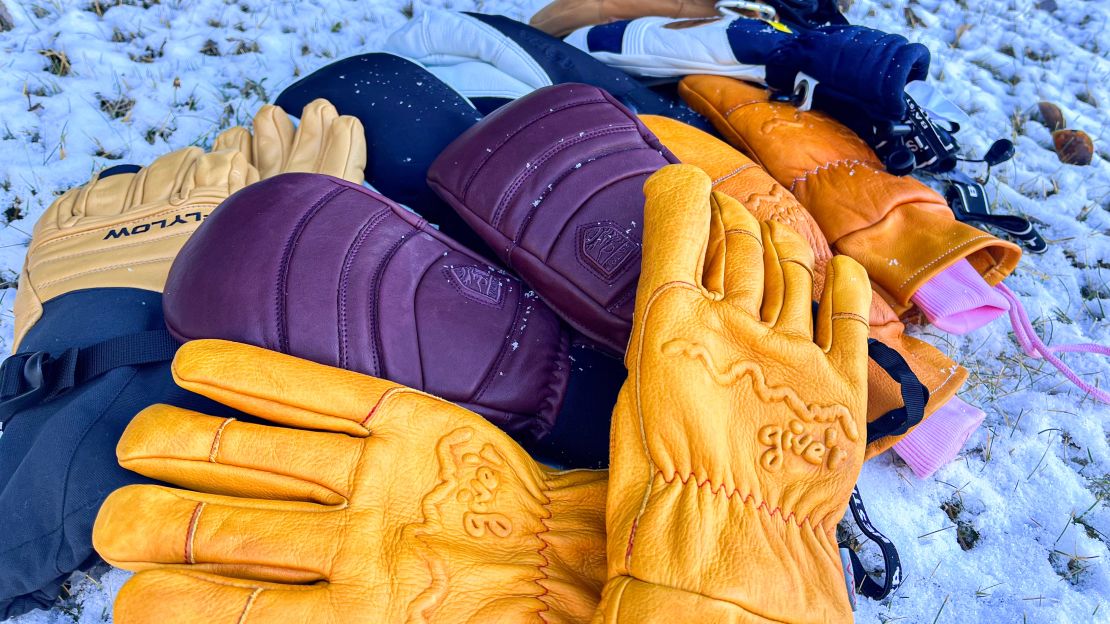
Ski gloves and mittens are essential for any ski day. Unless it’s a bluebird day in April, you likely cannot ski without something protecting your hands. But there are hundreds of options out there, so it’s a good idea to know what you’re looking for before beginning your search.
First, consider whether you want gloves or mittens. Gloves offer individual fingers, so you’ll get far more dexterity. This means ski tasks like buckling boots, zipping jackets or swapping goggle lenses will be far easier. However, the finger isolation means they are often colder than mittens. On the flip side, mittens are significantly warmer since your fingers will share body heat, and mittens have less exposed surface area than gloves, which also makes them toastier. But, of course, they come with a trade-off: Dexterity is slim when your digits are mashed together.
A third option is the three-finger, or lobster, mitten. These gloves have the thumb and pointer finger individually contained like a glove, but the remaining three digits are enclosed like a mitten. The idea behind this style of ski glove is that you’ll get a bit more dexterity with the thumb and pointer, but your remaining fingers will retain much more heat.
Secondly, look at insulation. You’ll find ski gloves with insulation ranging from fleece to synthetic fill, and their level of warmth will vary depending on a variety of factors, such as your personal circulation and how many grams of insulation are used in the glove. Oftentimes, more insulation leads to more warmth but also a lack of dexterity. Consider your needs before assuming you want the warmest glove out there.
Third, consider weather resistance. It may seem counterintuitive, but a lot of skiers won’t actually need fully waterproof gloves or mittens. If snow isn’t actively falling from the sky and you stay on your feet most of the time, it’s not always necessary. And gloves that are highly water resistant (instead of waterproof) tend to breathe a lot better than those that are completely impermeable. Snow can easily get inside your gloves from the wrist (raise your hand if you’ve ever dropped a glove while taking a photo), and that’s a surefire way to soak your ski mitten from the inside out. In this scenario, a water-resistant glove would dry out much faster than a waterproof option.
Finally, evaluate features. You may not need all the bells and whistles, especially if it pushes the glove into a price point you aren’t comfortable with. Premium, known partner brands like Gore-Tex will cost more than proprietary options. Features such as a short cuff or gauntlet cuff, touchscreen-compatible fingers and removable liners all add to the cost.
How we tested
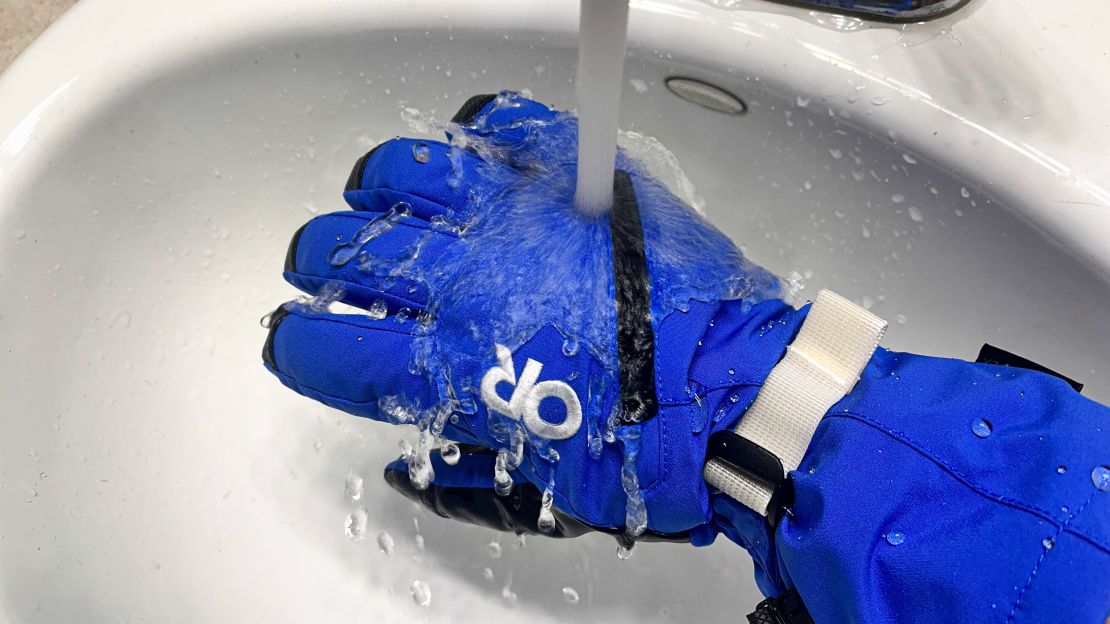
To determine the best ski glove and ski mitten, we objectively evaluated everything from warmth to style and even ease of use with all of skiing’s inherently cumbersome tasks. To do this, we divided testing into three categories: weather resistance, dexterity and features. From there, we directly compared the features of each pair of gloves through standardized, prescripted tests. Here’s the full breakdown of what we did.
Weather resistance
- Warmth: We placed small digital thermometers inside each pair of gloves before sealing the wrist closed with binder clips. We then placed the gloves inside our freezer for 20 minutes before removing the thermometers and getting a reading. We also wore them around outside during mountain fall in Colorado with evening temps hovering around 40 degrees Fahrenheit.
- Water resistance: While wearing the gloves, we placed them under a running faucet of water for three minutes to gauge when they would saturate, or wet out.
- Breathability: We wore the gloves while pedaling on our Peloton for five minutes, then we evaluated how sweaty our hands were.
Dexterity
- Ski tasks: While wearing the gloves or mittens, we gripped ski poles, handled ski boot buckles, changed goggle lenses and pulled goggles on and off helmets to determine how dexterous they were.
- Phone compatibility: We wore the gloves while using our iPhone to determine whether it was touchscreen compatible.
Features
- Bonus features: We evaluated the quality and quantity of features, such as wrist straps, pockets and carabiners to clip the gloves together.
- Fit: We also evaluated how well the cuff worked with ski jacket sleeves. Did it bunch up or feel awkward?
Other ski gloves and mittens we tested
Ba?st Classic Glove
$170 at Ba?st
Similar to the Ba?st mittens, we had no issues with the Classic Gloves. They were warm, dexterous and very waterproof. However, they cost significantly more than the Give’r 4-Season gloves, so that’s why they didn’t win the top spot.
Arc’teryx Sabre Index Mitt
$126 at Evo
We loved the dexterity, breathability and durability of the Sabre Index Mitt, but they weren’t as warm as the Hestra Fall Line Mittens — and they cost a bit more.
Flylow Super D Glove
$125 at Flylow
These gauntlet-style gloves have great weather resistance, and the goatskin leather has a surprising amount of dexterity (frankly, they look good too). However, they aren’t quite as warm as the Give’r 4-Season gloves, so they couldn’t nab the top spot.
Outdoor Research Carbide Sensor Gloves
$120 at Outdoor Research
The Carbide Sensor gloves were really warm and waterproof in our tests, and they are touchscreen compatible. However, the warmth comes with a lack of dexterity that we noticed when trying to buckle our ski boots.
Gordini Windward Glove
$120 at Gordini
Similar to the Carbide Sensor gloves above, the Windwards tested really well for warmth and waterproofness. They also have a decent number of features like a nose wipe and leashes. However, the warmth does come with a lack of dexterity. If you don’t care about that, these are really solid gloves.
Flylow Wolverine Glove
$120 at Flylow
These burly workhorses felt seemingly impenetrable in our water test, and we really like the sustainability story that goes along with Flylow’s manufacturing (wool lining and recycled insulation for less reliance on petroleum-based synthetics). However, these felt a bit too clunky doing regular hillside tasks.
Hestra Fall Line 3-Finger
$165 at Hestra
If you’re looking for a hybrid approach, you can do no wrong with these 3-Finger gloves since they have the warmth of the Hestra Fall Line mittens with a smidge more dexterity. However, we felt the warmth of the mittens far surpassed any added mobility found in the lobster design.
Hestra Army Leather Extreme Mitt
$175 at Hestra
If warmth is the only factor you care about, choose these, as they were the warmest in our test. However, the added insulation does come with a super-marshmallowy grip, so we’d save these only for the most frigid of days, and they may actually be too warm for some skiers.
Gordini Cache Gauntlet Mitt
$95 at Gordini
Truthfully, we think these gauntlet mittens are a heckuva value. They tested near the top of the pack for waterproofness, and they had decent dexterity, thanks to the five-finger lining inside. However, they weren’t quite as warm as the Ba?st Mitts. Still, if you don’t have the coin to drop on the pricier options, these are a great choice.
Give’r Frontier Mittens
$139 at Give’r
The Frontier Mittens were a hot contender for the best short-cuff mittens, thanks to their complete waterproofness and high-level warmth. Ultimately, we decided the break-in period on these may turn away some skiers — they will feel quite bulky until you run the oven test and wear them for a while — so we went with the Hestras. But, we really love these mittens. As an alternative option, Give’r recently launched a limited-edition version, dubbed the BCA Frontier Mittens, where 15% of the proceeds go toward resources and advocacy within the cancer community.
